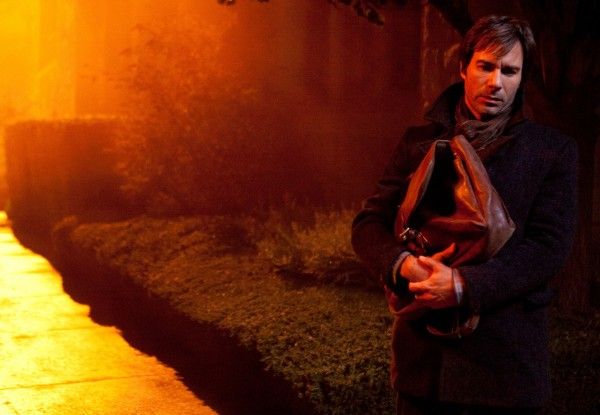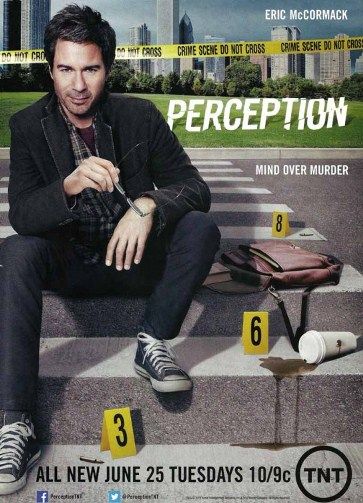The hit TNT drama series Perception returns for Season 2 on June 25th. On the show, Eric McCormack plays Dr. Daniel Pierce, a unique and eccentric neuroscience professor whose paranoid schizophrenia helps him solve crimes with FBI agent and former student Kate Moretti (Rachael Leigh Cook). Shaking things up this season, special guest star Scott Wolf joins the cast as Donnie, Kate’s soon-to-be ex-husband and a fast-rising Assistant U.S. Attorney who recently transferred back to Chicago and back into Kate’s life.
Collider, along with a handful of other outlets, was recently invited to the set to screen the compelling and intriguing Season 2 premiere and chat with some of the cast. During an interview while on a break from shooting, actor Eric McCormack talked about how it was to get back to filming, what fans can expect this season, how Daniel Pierce’s schizophrenia will continue to affect him, how this show has changed the way he views people in his own life, his dream hallucination, how the dynamic will evolve this season, the chemistry between Daniel and Kate, and the type of feedback he gets through social media. Check out what he had to say after the jump, and be aware that there are some spoilers.
Question: How has it been to get back into the show for Season 2?
ERIC McCORMACK: We’ve been going since February. I don’t know what I’m going to do when we stop. I’m just so into it now. It’s not a hardship, where I’m out of town or something. I live five minutes [from the set]. This is just my life now. It’s going to come crashing down, when the end of June comes.
What can fans expect from the premiere?
McCORMACK: Well, the premiere is somewhere about eight or nine months after we finished, last time. We really hinted at where it was going. The real-life manifestation of Natalie (Kelly Rowan), Caroline, and Pierce are now dating, which is a very big deal. It’s a very big deal that he’s on his meds. It’s a very big deal for anyone living with paranoid schizophrenia, even when they’re on their meds, to be able to connect like that. So, he’s in a great place, but of course, within an act or two, he screws it up. As he warned us, from the pilot on, he doesn’t like how it feels to be on meds. He doesn’t like how it feels to be controlled. That’s a problem that a lot of people living with the condition have. They feel better for awhile, and then they feel put down. They feel freer and truer to themselves when they’re off it, so he goes off. So, by the end of the episode, we recognize that. He’s not going to stay sane. I heard the greatest quote from Dr. Elyn Saks, who is someone I based a lot of the character traits on. She’s a USC professor living with paranoid schizophrenia, and she wrote a book, called The Center Cannot Hold, that was really informative. She said that, “If you take away my demons, you take away my angels, too,” and that’s how it is with Natalie. When the symptoms go, she goes with them. And as she said to him, at the end of last year’s season, “You have to let me go,” he doesn’t really want to.
With how things were left, at the end of last season, were you pretty anxious to see where things would go in Season 2?
McCORMACK: Well, I knew we couldn’t have him too healthy ‘cause then it’s just a show about a guy that teaches college. So, I knew that was going to happen, but how it was going to happen, I didn’t know. When Ken Biller said, “There’s no reason that we can’t have Natalie and Caroline, too,” I was like, “Oh, yeah! Now, I’m excited!”
Will we get to see a bit about how Daniel Pierce feels about people finding out about his schizophrenia?
McCORMACK: That was a big thing that I was surprised about. When it comes out in the courtroom scene with Scott [Wolf], then it’s out. How is that going to affect his status at the school? Luckily, this season, LeVar Burton is in most every episode, and he’s fantastic as the Dean. We establish, at the end of last season, and re-establish this season, how good of friends they are and how old of friends they are. The university is a safe place for Pierce, so the revelation that he’s living with this is not actually as big a deal, as it turns out. People do have more advanced ideas now, then they would have before. For him, I loved the hubris of someone who was a neuro-scientist having shame about having a mental illness. Of all people, he should be the one to be okay with it. That’s what made him complicated and interesting to me. Having to break through that and realize that it may actually benefit him to be out of the closet a little bit mentally, is interesting. There are going to be some ramifications. There’s an episode that we’re shooting, coming up, that will truly be a ramification of his being outed as someone living with this.
When you’re having a hallucination, the viewers can tell the difference when the camera work is different. How is that to play?
McCORMACK: Elyn Saks’ book is very descriptive about how it feels. While we might do some camera effects for the audiences’ sake, there are no camera effects in his brain. It’s just you. You’re just there. The key is that all of these things, for people living with it, are real. The voices are real. The manifestations are real. Their paranoia is real. What sets him about is that because he is a neuro-scientist and he does have enough self-consciousness, there’s going to be some great hallucinations this season that are clearly not really there. That’s where it gets fun. But, for the ones that could be anybody, it’s more shocking to him, sometimes, than the audience who might be looking for it. For me, it’s just about believing. It’s those moments where he realizes that you’re not really there and that no one else can see you that he has to get passed, and then readjust.
Has this affected how you see people, in your own life?
McCORMACK: We see people talking to themselves, all the time. We always have. Particularly if they’re homeless people or at all questionable, there’s a sense of, “That guy’s crazy!” I see that now with a much more empathetic eye. I’ve got a kid in the backseat going, “Dad, look at that guy!,” and the first thing out of my mouth is, “No, you’ve gotta understand, honey, he’s talking to someone. The person he’s talking to is there. He’s having a conversation, and he might very well be saving his own life.” So often, particularly with voices, you’re hearing horrible things, demon voices, and voices telling them that they’re not worth it or that they’re going to kill somebody. In those moments, they’re overcoming things. I never would have thought of that before.
But, Daniel Pierce’s voices are always kind of helpful, don’t you think?
McCORMACK: Well, part of it was a conscious desire to break the stigma, a little bit. So often, the stigma is violent voices creating violent behavior. That’s what we’ve seen in a lot of television shows. That person ends up being the guilty party, but that’s not always the case. Sometimes it’s not demons. Sometimes it’s just other opinions and other voices. Particularly in television, we can stereotype ourselves. You realize that we all have a lot of voices in our head. We have angry voices, we have voices of doubt and we have moments of strength. I get to actually have them physically manifest as a woman, as a child, as a criminal, as Joan of Arc, and that’s so cool. It gives me something to remember that I’m not just imagining a historical character. It’s a piece of my brain.
Do you have a dream hallucination for your character, that you’d love to see happen?
McCORMACK: Yes, I think I should hallucinate a dominatrix.
Do you have to do research with each script?
McCORMACK: With these scripts and these writers, so much of it is done for me. Because we don’t just throw words around, we make sure the audience understands. I know almost as much as I need to know, strictly from the exposition. It’s part of his voice to expositize in a way that’s entertaining. When it’s in a classroom, that helps. Or it’s educating Scott Wolf’s character. Or it’s educating the victim.
How is the team’s relationship different this season, and what role will Scott Wolf’s character play?
McCORMACK: [Kate] Moretti’s ex-husband was referenced last season. To bring him in has been so interesting. So often, what happened with Kate last season was that she was forced into a, “How did you figure that out professor?,” mode. If you take her out of the show, it’s a show about a guy that lectures at a university. You could take me out of the show and still have a crime show. She’s crucial, as the crime-solver. Having him there as someone to butt heads with, in her world, gives her a lot more strength and drive. Sometimes I can be the sidekick to her, in a crime-solving scene, as opposed to always being about me.
Is the romantic element between Daniel and Kate over?
McCORMACK: No. You know that we have to stretch that out, for many seasons, I hope. It’s still there. What I discovered in Tweeting, last summer during the show, is that people are drawn to this team, and that’s great. That’s what you hope for. But, you can’t do anything with that, right now. There are lots of roadblocks and lots of things. We do get into it, because of Scott’s character. He comes in, looking to get back with Kate, and what he sees makes him go, “What the hell is this?!” He sees stuff that the audience sees, that even Kate and Daniel don’t see. That’s a fun, new perspective on it.
Will Daniel Pierce be in peril, this season?
McCORMACK: Yes, I would say more so this year than last year. If I’m just a detective that’s doing pretty good this week, then what’s the show. There are several episodes that he’s very imperiled by his involvement. It’s been a great ride. The one about collective blindness is one that is very bad for him. And then, the one that we’re about to start shooting is called “Asylum.” That’s not good for him, either.
Because there is so much to talk about with this show, do you get a lot of fun fan feedback about the episodes and the characters?
McCORMACK: The live Tweeting was really informative last year because it isn’t just people saying, “Ooh, what’s going to happen next?” People are learning cool things. E.R. taught you cool things, but there’s something about learning brain stuff and learning about things that could explain someone you knew, 20 years ago, that makes you go, “Fuck, that’s what that guy must have had, right?!” I find that with every script I get, I go, “Who knew this?! This is so cool!” A lot of the stuff they’re coming up with this year is stuff that I have heard of recently. We have an episode about collective blindness, which is the idea that 45 people can be at a subway platform and no one will see someone get murdered because no one is paying attention.
Perception returns to TNT for Season 2 on June 25th.





